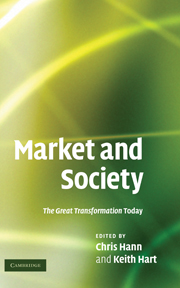Book contents
- Frontmatter
- Contents
- List of figures and table
- List of contributors
- 1 Introduction: Learning from Polanyi 1
- 2 Necessity or contingency: Mutuality and market
- 3 The great transformation of embeddedness: Karl Polanyi and the new economic sociology
- 4 The critique of the economic point of view: Karl Polanyi and the Durkheimians
- 5 Toward an alternative economy: Reconsidering the market, money, and value
- 6 Money in the making of world society
- 7 Debt, violence, and impersonal markets: Polanyian meditations
- 8 Whatever happened to householding?
- 9 Contesting The Great Transformation: Work in comparative perspective
- 10 “Sociological Marxism” in central India: Polanyi, Gramsci, and the case of the unions
- 11 Composites, fictions, and risk: toward an ethnography of price
- 12 Illusions of freedom: Polanyi and the third sector
- 13 Market and economy in environmental conservation in Jamaica
- 14 Embedded socialism? Land, labor, and money in eastern Xinjiang
- 15 Afterword: Learning from Polanyi 2
- Bibliography
- Index
6 - Money in the making of world society
Published online by Cambridge University Press: 08 August 2009
- Frontmatter
- Contents
- List of figures and table
- List of contributors
- 1 Introduction: Learning from Polanyi 1
- 2 Necessity or contingency: Mutuality and market
- 3 The great transformation of embeddedness: Karl Polanyi and the new economic sociology
- 4 The critique of the economic point of view: Karl Polanyi and the Durkheimians
- 5 Toward an alternative economy: Reconsidering the market, money, and value
- 6 Money in the making of world society
- 7 Debt, violence, and impersonal markets: Polanyian meditations
- 8 Whatever happened to householding?
- 9 Contesting The Great Transformation: Work in comparative perspective
- 10 “Sociological Marxism” in central India: Polanyi, Gramsci, and the case of the unions
- 11 Composites, fictions, and risk: toward an ethnography of price
- 12 Illusions of freedom: Polanyi and the third sector
- 13 Market and economy in environmental conservation in Jamaica
- 14 Embedded socialism? Land, labor, and money in eastern Xinjiang
- 15 Afterword: Learning from Polanyi 2
- Bibliography
- Index
Summary
A “Magellan moment”
According to writers as varied as John Locke and Karl Marx, ours is an age of money, a transitional phase in the history of humanity. Seen in this light, capitalism's historical mission is to bring cheap commodities to the masses and break down the insularity of traditional communities before being replaced by a more just society. It matters where we are in this process, but the answers given differ widely. When a third of humanity works in the fields with their hands and a similar number has never made a telephone call in their lives, I would say that capitalism still has quite a way to go. This chapter takes off from Karl Polanyi's perspective on his moment in history, in The Great Transformation, for analysis and inspiration when addressing our own moment. I will also draw on the work of Marcel Mauss (Hart 2007a), whose name is increasingly joined with Polanyi's by those who advocate more socially responsible versions of economy. My focus will be on the evolution of money at a time when world society is being formed rapidly at considerable risk to us all. I prefer to call this “the new human universal” rather than the normal term, “globalization.”
Magellan's crew completed the first circumnavigation of the planet some thirty years after Columbus crossed the Atlantic.
- Type
- Chapter
- Information
- Market and SocietyThe Great Transformation Today, pp. 91 - 105Publisher: Cambridge University PressPrint publication year: 2009
- 14
- Cited by



